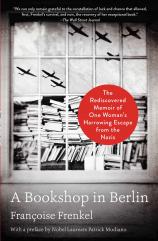A Bookshop in Berlin: The Rediscovered Memoir of One Woman's Harrowing Escape from the Nazis
Review
A Bookshop in Berlin: The Rediscovered Memoir of One Woman's Harrowing Escape from the Nazis
After enjoying a pleasant, personally satisfying life as the owner of a bookshop in Berlin catering to lovers of French art and literature, then struggling daily to survive amid the horrors of the Nazi era, author Françoise Frenkel was finally able to tell her story. This journalistic account was first published in 1945 under the title NO PLACE TO LAY ONE’S HEAD and was recently rediscovered and translated by Stephanie Smee, with a preface by Nobel Laureate Patrick Modiano.
"[Frenkel's] chronicle is a reminder of the evils of Nazism, which perhaps should be studied again by each new generation lest such a hate-filled philosophy should ever reemerge, in whatever form, in whatever place."
The first few chapters recount the mounting suspicions and dread that hovered over all Jewish people in Germany in the early days of the Nazi takeover, leading up to the notorious Kristallnacht in 1938. As a foreigner, Frenkel narrowly missed some of the worst abuses and managed to flee to Paris. But even there, the noose tightened. Frenkel’s account, based on what was surely a prodigious memory, gives at times an hour-by-hour picture of the foreboding that gripped her. She was befriended by a few bold, non-Jewish compatriots, and encouraged to move to more pleasant, less fraught locations --- Nice, Avignon, Vichy --- by a former professor, who also tried unsuccessfully, in one of the few humorous passages in this harrowing tale, to mate her with an aging Frenchman so as to guarantee her safety.
All French citizens were forced to stand for hours a day in lines for rations and often came home empty-handed, and all were subject to the disrupting, constantly changing regulations of the Nazi occupiers that affected every aspect of life. But as a Jew, Frenkel was also increasingly hounded and hunted, finally forced to take refuge with friends, but soon realizing they were imperiling themselves by giving her shelter. Determined to flee to Switzerland, she was arrested, but then miraculously freed based on a few letters from prestigious contacts who bespoke her fine character. In a final, fraught few minutes depicted at the end of the book, she managed to cross the border into Switzerland, from where she composed her memoir.
A dossier is included with a chronology of the events described in Frenkel’s vivid account. She had a husband (though she does not mention him) who left Germany earlier and was eventually put to death at Auschwitz-Birkenau. She was able to return to France after the war and reclaim some of her possessions, and died in Nice in 1975. No photo of her survives.
Frenkel sets an example of undaunted courage and resolve, especially considering that she was a female, and alone. Her chronicle is a reminder of the evils of Nazism, which perhaps should be studied again by each new generation lest such a hate-filled philosophy should ever reemerge, in whatever form, in whatever place.
Reviewed by Barbara Bamberger Scott on December 6, 2019
A Bookshop in Berlin: The Rediscovered Memoir of One Woman's Harrowing Escape from the Nazis
- Publication Date: August 4, 2020
- Genres: Memoir, Nonfiction
- Paperback: 288 pages
- Publisher: Atria Books
- ISBN-10: 1501199854
- ISBN-13: 9781501199851



